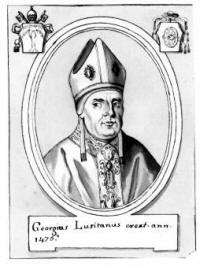Jorge da Costa
- For Brazilian footballer, see Jorge Alberto da Costa Silva.
- For Portuguese businessman, see Jorge Nuno Pinto da Costa.


Dom Jorge da Costa[1] (1406 – 18 September 1508) was a Portuguese Cardinal.[2][3]
Biography
Born in Alpedrinha, Fundão, he is often called the Cardinal of Alpedrinha. He was one of many children of Martim Vaz and wife Catarina Gonçalves. He made benefits to all his brothers and sisters.
He held a very large number of ecclesiastical offices. He was Archbishop of Lisbon 1464-1500 and 108th Archbishop of Braga 1486-1501.
He was the confessor of Afonso V of Portugal. From 1478 he was in exile in Rome,[4] having clashed with John II of Portugal, at that point in power though not yet reigning. He died a centenarian in Rome. He is buried in the church of Santa Maria del Popolo in the Costa Chapel that he purchased in 1488 and furnished with high quality works of art.
At age 102, Jorge da Costa is the oldest Cardinal in history.[5]
Notes
- ^ Giorgio da Costa, George Da Costa.
- ^ From 1476. He was bishop of Albano from 1491 to 1501, bishop of Frascati 1501-1503. He was bishop of Porto and Santa-Rufina in 1503.
- ^ Miranda, Salvador. "COSTA, Jorge da (1406-1508)". The Cardinals of the Holy Roman Church. Florida International University.
- ^ Christopher Columbus; excerpts from the book,Uncovering the Real Columbus Archived 2007-06-25 at the Wayback Machine
- ^ Oldest cardinal, Guinness World Records
br
|}
